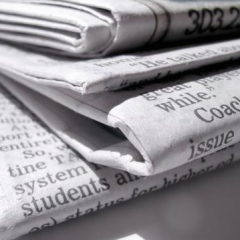For the Economist: This is A Journalistic Spring
The Economist is running a major series on the global news industry, well-worth checking into, excerpts available for non-subscribers. As part of that effort, I’ve been asked to contribute, among a half-dozen others (Dan Gillmor, David Levy, Ying Chan, Larry Kilman, weekly thoughts. For week 1: “What makes you most optimistic about the future of the news business?”
Here’s my take, below, and a link to others’ takes:
CALL IT Journalist Spring. A wild-eyed optimist just arriving for this stage of the news revolution might be overwhelmed by the unexpected flowering of journalism, news-gathering and news-writing, increasingly un-tethered from traditional ties.
Okay, our just-arrived optimist would have to have somehow missed Journalist Winter, an unprecedented winnowing of the news herd, with more than 10,000 jobs lost in newspapers in the U.S. and thousands more in the UK and Europe. That winter aside (for a moment) we’ve never seen such potential for the news reader, and, I believe, the global news business.
As in any revolution, what we have seen first is great disruption. Disruption inevitably means destruction, bad and good. For this exercise in optimism, let’s look at four surpassing positive impacts of this great news disruption:
The local newspaper editor is no longer the supreme arbiter of what his readers read. In the old print days, many regional newspaper editors (and in America, that has meant all the 1500+ newspapers, save three national ones) decided what their readers would read, defined what their readers would think was news. We were gatekeepers, holding all the keys. The internet took those keys away, defeated distance and opened hundreds of millions of readers’ eyes to other news organisations – from great to god-awful. So the rough justice of an evolving meritocracy has replaced the old print walled garden.
News is being broken out of its old, calcified molds. You could buy news one way, in a single package, a daily newspaper or a magazine. The container (newsprint largely) defined the news. Now, we’re at the beginning of the change. Kindle Singles first gave us the radical notion that a book didn’t need to be book-length; “50,000 words,” as my publisher told me with Newsonomics, not 40,000 or 60,000. Such innovations as tiny Atavist are helping redefine longer-form and investigative journalism into the length that stories or series need. Longer than a traditional newspaper story, shorter than a book, more flexible than a magazine feature, we’re starting to see various kinds of breakouts from the old form. The iPad itself will soon spawn many new news “products” as publishers figure out how to create niche news and feature content to fit the lives, and life stages, of their readers.
Storytelling can be mixed and matched: Journalism schools used to force students to choose: news/editorial (meaning print/newspapers), magazines or broadcast. That channeling meant that news and feature journalists learned one craft, some well. Today’s journalism students face radically new curricula emphasising multimedia storytelling, teaching the next generation of students to use all the tools available, picking the best to tell the particular story. Readers (especially those entering the 4G era through iPads) are the beneficiaries when the craft is done well, using the new techniques atop old-fashioned shoe leather reporting and taxing analysis.
National boundaries no longer define news: I recently chronicled (in time for American Independence Day from you-know-who) the British news invasion of America. The internet has not just taken down walls between cities, counties, regions, provinces, cantons and states. It has removed them from between countries. Most quality London dailies see only a third of their web visitors coming from Britain, an equal number (or more) from America and the other third from the rest of the world. The New York Times and the Wall Street Journal see a quarter to a third of visitors coming from overseas. BBC.com has planted a strong flag in America, even as it is assailed at home. Language now defines what we can read more than nationality, and auto-translate programs will further obliterate national bounds in the next five years. That means more choice, more perspective—and maybe less provincialism for all of us.




